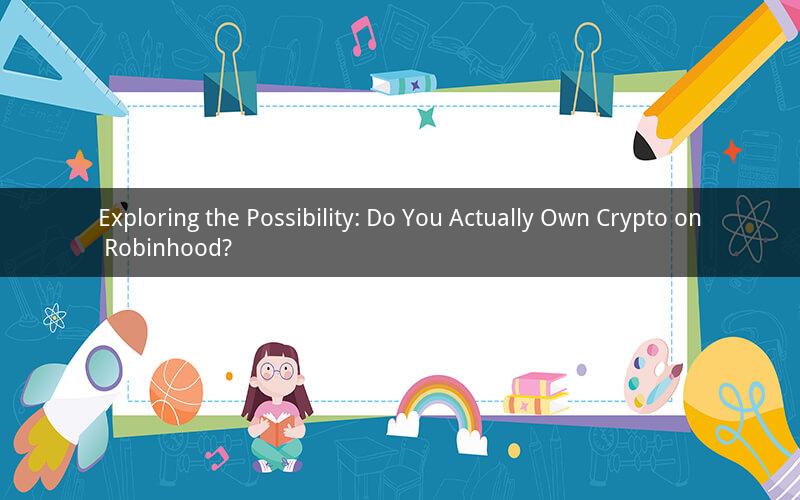
Introduction:
The rise of cryptocurrency has revolutionized the financial industry, attracting a wide range of investors. Among the popular platforms for buying and selling cryptocurrencies, Robinhood has gained significant attention. However, many users raise questions about the ownership of their crypto assets on Robinhood. In this article, we delve into the topic of whether or not you actually own crypto on Robinhood and explore the underlying reasons behind it.
Section 1: Understanding Cryptocurrency and Robinhood
1.1 What is Cryptocurrency?
Cryptocurrency is a digital or virtual form of currency that operates independently of a central bank. It relies on cryptography for security and is typically created through a process called mining. Bitcoin, Ethereum, and Litecoin are some of the most well-known cryptocurrencies.
1.2 What is Robinhood?
Robinhood is a financial technology company that offers a mobile app for trading stocks, options, ETFs, and cryptocurrencies. It is known for its user-friendly interface and low fees, making it accessible to both novice and experienced investors.
Section 2: The Concept of Ownership in Cryptocurrency
2.1 Ownership of Cryptocurrency
Ownership of cryptocurrency refers to the exclusive control and rights over digital assets. When you purchase cryptocurrency, you possess the private keys that grant you access to your assets and enable you to transfer them to other wallets or addresses.
2.2 The Issue of Ownership on Robinhood
While many users believe they own their crypto assets on Robinhood, there are concerns regarding the actual ownership. This section explores the reasons behind this debate and the implications it holds for investors.
Section 3: The Truth Behind Owning Crypto on Robinhood
3.1 Robinhood's Custodial Model
Robinhood operates on a custodial model for cryptocurrency trading. In this model, Robinhood holds the private keys to your assets, which means they have control over your crypto assets.
3.2 The Controversy
The controversy arises from the fact that users have limited access to their private keys, which raises questions about the true ownership of their assets. Many argue that without full control over their private keys, users do not truly own their crypto on Robinhood.
3.3 Robinhood's Response
Robinhood has faced criticism for its custodial model, but the company maintains that it provides a secure and convenient platform for users to trade cryptocurrencies. They emphasize the benefits of a centralized platform, such as regulatory compliance and insurance for customer assets.
Section 4: The Implications and Concerns
4.1 Lack of Control
The custodial model raises concerns about the lack of control over private keys, which can have significant implications for users. If Robinhood were to face financial difficulties or regulatory challenges, users might find it challenging to retrieve their assets.
4.2 Security Concerns
While Robinhood claims to prioritize security, the centralized nature of the platform can pose risks. If the platform experiences a security breach, users' assets might be at risk.
4.3 Market Manipulation
With Robinhood's centralized control over private keys, there is a possibility of market manipulation. This could lead to unfair trading practices and undermine the decentralized nature of cryptocurrencies.
Section 5: Alternatives and Solutions
5.1 Self-Custody
One solution is for users to adopt a self-custody approach, where they have full control over their private keys. This can be achieved by transferring their crypto assets to their own wallets or using decentralized exchanges.
5.2 Regulation and Transparency
Advocates argue for increased regulation and transparency in the cryptocurrency industry to ensure the protection of users' assets. This includes implementing strong security measures and holding platforms accountable for their actions.
5.3 Robinhood's Future
As the debate continues, Robinhood may consider adopting a more decentralized approach or providing users with the option to self-custody their assets. This could help address the concerns surrounding ownership and enhance user trust.
Conclusion:
The question of whether or not you actually own crypto on Robinhood is a topic of debate. While Robinhood operates on a custodial model, which raises concerns about ownership and control, users can explore alternatives such as self-custody and advocate for increased regulation and transparency. As the cryptocurrency industry evolves, it is crucial for users to understand the implications and take appropriate measures to safeguard their assets.
FAQs:
1. What is a custodial model in cryptocurrency trading?
A custodial model refers to a system where a third-party holds the private keys to your assets, granting them control over your cryptocurrency.
2. Can I withdraw my crypto assets from Robinhood at any time?
Yes, you can withdraw your crypto assets from Robinhood at any time. However, the process may vary depending on the specific cryptocurrency and your account settings.
3. Are my crypto assets insured on Robinhood?
Yes, Robinhood provides insurance for customer assets, including cryptocurrencies. However, the extent and terms of insurance may vary.
4. Can I transfer my crypto assets to my own wallet on Robinhood?
No, Robinhood does not provide a direct option to transfer your crypto assets to your own wallet. However, you can withdraw your assets and then transfer them to a wallet of your choice.
5. Is it safe to trade cryptocurrencies on Robinhood?
Robinhood is a regulated platform that offers security measures to protect user assets. However, like any investment, trading cryptocurrencies on Robinhood involves risks, and it is essential to conduct thorough research and understand the potential risks involved.